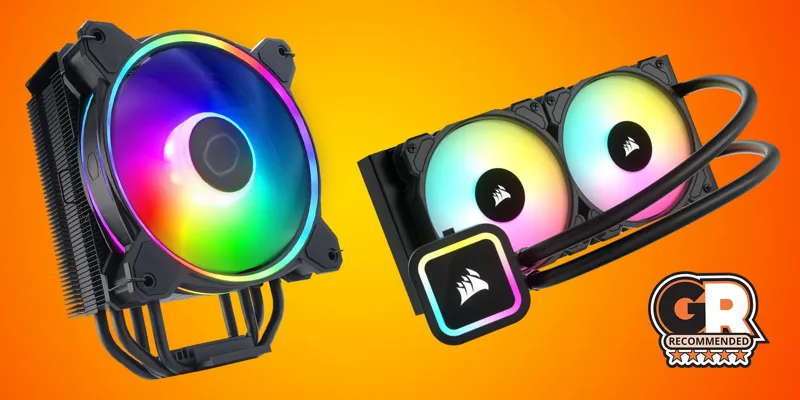Debates over air cooling versus water cooling have long intrigued PC enthusiasts. Each method has its unique advantages and drawbacks that can heavily influence the decision-making process. While air cooling systems may appear basic and straightforward, water cooling systems are often more intricate and visually appealing. However, choosing between them involves considerations beyond mere aesthetics.
If you're grappling with the choice between air and water cooling for your PC gaming rig, this article aims to address all your queries by exploring the pros and cons of each method in detail to help you make the right decision.
Comparing Cooling Methods
When comparing air cooling against water cooling, several essential aspects should be taken into account to make an informed choice:
- Budget: Setting a realistic budget is crucial. Generally, air cooling systems are more budget-friendly than liquid cooling setups.
- Performance & Efficiency: Despite higher upfront costs, water cooling systems offer superior efficiency, resulting in lower temperatures that enhance overall performance and component longevity.
- Noise Level: Air cooling systems tend to be noisier due to higher fan speeds, whereas water cooling setups offer quieter operation.
- Visuals & Customization: Water cooling allows for more customization and sleeker aesthetics, fitting better in PC cases compared to air cooling systems.
- Maintenance: Water cooling systems demand more maintenance to sustain low temperatures, while air cooling setups are generally more low-maintenance.
- Difficulty: Building and maintaining water cooling systems require a learning curve and more effort compared to air cooling setups.
Budget
![]()
Cooler Master Hyper 212 Halo Black
$42 $50 Save $8The Cooler Master Hyper 212 provides efficient cooling at an attractive price, suitable for both novice and experienced builders. Note that this air cooler is more suitable for larger cases with ample clearance.
Pros- Good Value
- Includes Thermal Paste
Cons- Takes Up Space
- Not Whisper Quiet
See at Amazon $42 at Best Buy $48 at Walmart![]()
Corsair H100x RGB Elite Liquid CPU Cooler
The Corsair H100x RGB Elite AIO Cooler offers a stylish cooling solution for modern motherboards, with customizable RGB features through Corsair's iCUE software. This CPU cooler, equipped with a 240 mm radiator, fits most PC cases while providing efficient cooling.
Pros- Fits 240mm Radiator
- Quiet Operation
- Includes Pre-Applied Thermal Paste
Cons- Complex Instructions
See at Amazon
In general, air cooling is more cost-effective for PC cooling. To build an air-cooled system, focus on a quality CPU air cooler, suitable case fans, and optionally, a PC case that enhances airflow. Utilizing stock GPU coolers and fans can further save costs and maintain optimal temperatures.
On the other hand, calculating expenses for a water-cooled setup is more complex. Building a custom water cooling loop for maximum performance requires additional components like radiators, reservoirs, tubing, GPU, and CPU blocks, significantly adding to the overall cost.
However, an All-In-One (AIO) Liquid Cooler offers a simpler way to experience liquid cooling benefits without the complexity of a full custom loop.
Performance & Efficiency

Performance in either cooling method depends on various factors such as ambient temperature, case design, and component TDP. Water cooling consistently achieves lower temperatures due to superior heat transfer efficiency. The coolant absorbs heat from components and dissipates it through a radiator, maintaining a continuous cooling cycle.
While air coolers have been effective historically, modern components generate more heat, increasing the need for bulky designs to manage temperatures.
Noise Level

Air-cooled systems often produce noticeable fan noise under heavy loads, resembling a loud whirring sound. In contrast, water-cooled PCs operate quietly, even during demanding tasks, with fans running at lower speeds. However, water cooling introduces its subtle noises like water flow or pump operation.
For noise-sensitive environments like recording studios or bedrooms, water cooling is a preferred choice due to its quieter operation.
Visuals & Customization

The appeal of water cooling largely stems from its visual aesthetics. Air cooling setups tend to be basic and limited in customization options, while water cooling offers extensive customization possibilities. Users can personalize their builds with RGB lighting, tubing configurations, and colored coolant, resulting in a unique and visually striking PC.
Furthermore, water cooling is more versatile for compact builds, providing a wide range of sizing options for small form factor cases.
This freedom of customization has fostered a vibrant community of water-cooled PC enthusiasts who continually push the boundaries of PC design, often turning their systems into works of art.
Maintenance

In terms of maintenance, air-cooled systems are straightforward, requiring occasional cleaning to remove dust buildup. More intensive maintenance may involve disassembling the system to clean components and reapply thermal paste.
Conversely, water cooling setups demand regular checks on coolant levels and clarity, with recommended coolant changes every six months to prevent issues like staining or sediment accumulation. Extensive maintenance, including full disassembly, may be necessary in specific cases.
Difficulty

Air cooling is considered beginner-friendly, requiring minimal expertise to install and maintain. Identifying the right air cooler and fan setup is typically all that's needed for an efficient air-cooled system.
In contrast, water cooling demands more research, patience, and skill to build and maintain without leaks. It caters more to experienced enthusiasts looking for enhanced performance and aesthetics, making it a more involved process but potentially more rewarding.
Which is the Best for Gaming?
For avid PC gamers seeking top-tier performance and aesthetics, water cooling stands out as the superior choice. While more demanding in terms of effort and cost, water-cooled systems offer better thermals, longevity, and quieter operation.
On the other hand, air cooling provides a straightforward and budget-friendly solution for gamers prioritizing simplicity and cost-efficiency without delving into complex customization.
The decision between air cooling and water cooling ultimately depends on personal preferences, budget constraints, experience level, and the time one is willing to invest in their gaming setup.



